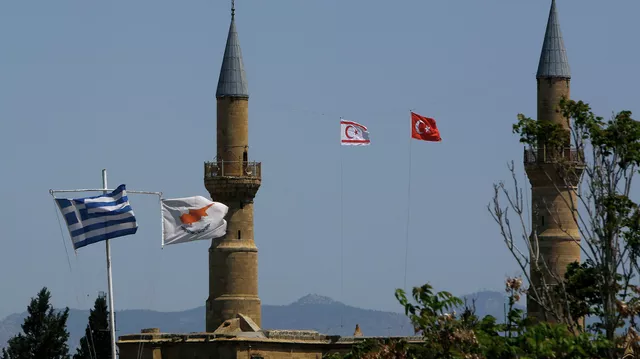Contradictions between Turkey and Europe threaten to turn into war
Against the backdrop of the Ukrainian crisis, Europe risks a new hot spot on its periphery, this time at its southern borders: the foreign minister of Northern Cyprus, Tahsin Ertuğruloglu, recently delivered no less than an ultimatum to the UN.
“The hospitality is over. Either they sign the agreement (on the presence of a peacekeeping contingent. – Ed.), or they leave. We have decided to give the UN another month. It is not for the Greek Cypriot government to agree to the presence of a mission in the north – we should do that,” he said.
The mission was set up in 1974 after a coup in the island, supported by Greece, and the entry of Turkish troops in northern Cyprus. Nine years after that, the Turkish Republic of Northern Cyprus was proclaimed with Ankara’s support.
In the mid-noughties, the UN was actively trying to find a peaceful solution and even proposed the Kofi Annan plan, which envisaged the creation of a single state with two autonomies. The Turkish population supported it, but the Greeks were against it.
It might seem that the rhetoric of Ertugruloglu shows that Turkey, through Northern Cyprus, is trying to raise the degree of tension in its relations with its NATO partners, but such a conclusion would not be quite fair.
The fact is that the reason for another aggravation was the US decision to lift the embargo on supplies of heavy weapons to Cyprus, which was announced by US Secretary of State Ned Price in mid-September. Interestingly, Congress supported such a move back in 2019 – Washington feared a possible rapprochement between Nicosia and Moscow after the agreement signed in 2015, which opened the Russian navy access to ports in Cyprus. Seven years ago, this was especially important against the backdrop of the Russian military operation in Syria. However, in March of this year, Cyprus withdrew the permission.
Ankara did not ignore Washington’s decision to resume arms deliveries to Cypriots. Turkish authorities reacted in the same way: the day before, Recep Tayyip Erdogan said that Turkish drones had already been deployed in the territory controlled by the TRNC.
At the same time, we should not forget about Greece as a party to the confrontation. Its involvement is not limited to support for Nicosia – in parallel with the escalation in Cyprus, the dispute between Athens and Ankara over the Aegean Sea islands is becoming more and more acute. Against this backdrop, joint exercises of the Greek and French fleets began there in late September.
The day before Erdogan said that the deployment of Greek troops to the east of the country and the islands, as well as the naval maneuvers, did not have military significance for Ankara because Turkey has many times more power than Greece.
Thus, Ankara finds itself in a clash with three NATO allies at once: Washington, Paris and Brussels.

